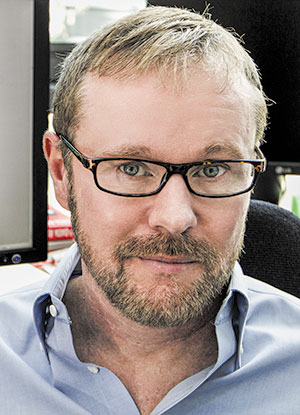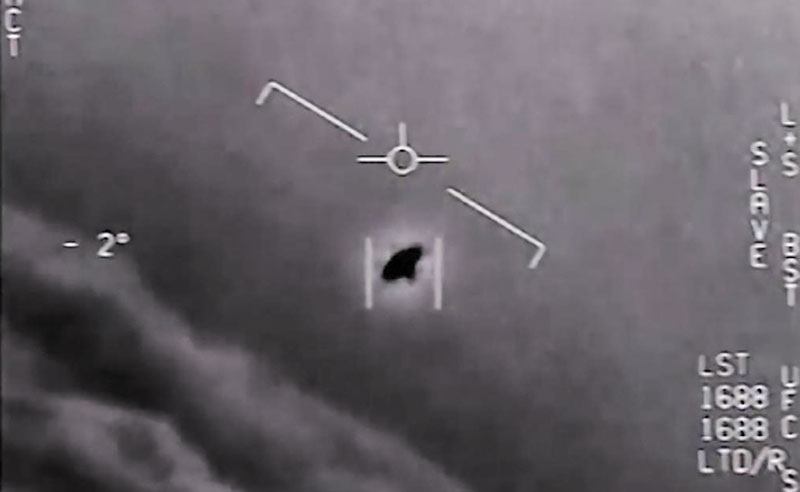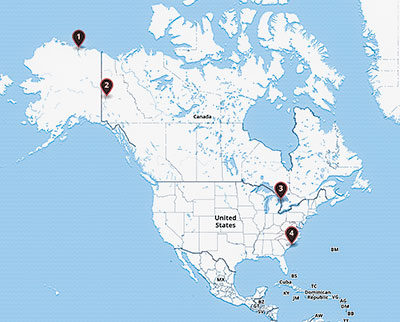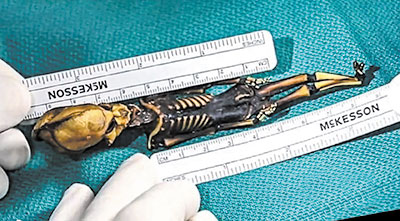The Atacama Desert ‘alien’ skeleton
Openly gay scientist Garry Nolan is well-known and respected as a professor of microbiology and immunology. He’s also one of the government’s go-to experts on UFO
JEFF McKISSACK | Contributing Writer
Jeff@DefenseByDesign.com
Dr. Garry Nolan is the director of the Stanford NHLBI Proteomics Center and professor of microbiology and immunology at the Stanford University School of Medicine with more than 300 research articles, including more than 120 peer-reviewed papers, to his credit. He holds 40 U.S. patents and has been honored as one of the top 25 inventors at Stanford University. Nolan, who has been with his husband Timothy for 20 years, is considered by many to be among the world’s foremost immunologists, and this year he has been nominated for a Nobel Prize.
But it is his work and outspoken position on UAPs — Unidentified Anomalous Phenomena, better known as UFOs — that has put him in the spotlight recently with all the talk of “Chinese balloons” and unknown objects being shot down by the U.S. military. His work on UAPs has also secured the ears of many in Congress and the intelligence community, with whom he has worked since 2012.
I recently spoke with Nolan regarding his work and insights into UAP/UFO phenomena as well as his status as an openly gay scientist and LGBTQ rights advocate.
Jeff McKissack: What is your earliest recollection of being gay and what was your personal coming out experience? Garry Nolan: At 21, during my junior year at Cornell, I had a girlfriend [who] wanted to go to [what I] later learned was called a Tea Dance. I had no idea where we were going or that such a thing existed. When I got on the dance floor, I noticed that I was the only guy there dancing with a woman. It wasn’t until I got back to my fraternity and was sitting on my bed recollecting my feelings regarding the experience and it literally popped into my head, “You’re gay.” And that was it — no fanfare, no drama, just that immediate realization and self-acknowledgement.

Dr. Gary Nolan
In retrospect I did start putting things together and, at one point, humorously said to myself, “Well, all your best friends ‘are’ really good looking.”
I think this is why it has always been difficult for me to relate to so many others who I know struggled in their own coming out experience. For me, it simply happened. My coming out literally took place in a moment, and I never looked back.
Do you feel this self-recognition and coming out experience hindered or empowered you in your professional achievements? How so? I think being gay is something that those in the majority of society around you don’t accept, but you come to accept for yourself. It becomes a matter of just pushing through, saying to others, “I will not allow you to shame me, and, if anything, I am going to shame you. I have an objective. I know I’m right, and I know I’m not doing anything wrong, so get out of my way.” And that same kind of attitude is how I do my work.
Many times people tell me either I shouldn’t be doing something, or there’s a certain type of research or experiment that others tell me won’t work, and I say to myself, if not to them, “No, I know it will work. Get out of my way.”
[It] goes to back to my experience with the gay community in that it allows my creativity to flow, because you’re not constrained by someone else’s boundaries. And this means that intellectually, culturally, or socially you can reach beyond those boundaries and find new solutions.
What have been your areas of involvement or activism within the LGBTQ community? I was in the laboratory with Leonard and Leonore Herzenberg who developed the first instrument used to count T-cells. It was the principle system used to evaluate those with HIV. Our senior programmer was what we all would refer to today as a “leather daddy,” who is still today a brilliant mathematician and computer scientist and himself was diagnosed with HIV in the early days.
I got involved in ACT UP’s Golden Gate chapter as they wanted someone to teach immunology to the activists so they would be competent in the information they were articulating to the community. I wasn’t involved in any of the marches or similar but contributed in the way I knew I could and a way that was unique. I also went to the first World Conference on AIDS in Paris just to learn all I could.
Later I ended up in a lab at MIT with David Baltimore, the Nobel Prize winner of Nobel Prize winners. My project was to clone the protein that is part of the activation process for HIV, so I did that. So I’m proud to be a gay man who cloned the activating factor that binds to the DNA in the cell of HIV and turns it on.

An image from video provided by the Department of Defense shows an unexplained object from 2015.
How did you become active in the current UAP/UFO issue and community? Who first “came out” to whom? I had an early experience in my childhood as well as a sighting of my own at age 12 as a paperboy out on my route early one morning with something going over my head. So I guess they came out to me first. But in retrospect it all came together, much like my experience being gay. It was an “Oh, that’s what it was” moment.
But I didn’t act on it until I started looking around on the internet and going down the rabbit hole looking at videos on YouTube, which only made me more confused. It wasn’t until my involvement in studying the Atacama Skeleton [a skeleton found buried in the Atacama Desert back in 2003 rumored to be alien] where I was allowed to apply science [to the subject]. I was able to decisively put it to rest as, unfortunately, it was the skeleton of a pre-term young girl who had died due to a genetic deformity. But it was my way of sending up a flag to say I am a scientist with a reputation who is willing to do true science, including peer review, on this type of “fringe” topic.
t worked. Others then working within the government and intelligence community started reaching out to me, the “inner crew” driving the narrative we see playing out today. As I showed myself more and more being able to do credible science in the area, I have been dragged further and deeper into the reality of this phenomena.
Unfortunately I cannot talk about some of the stuff that is obvious, but all you need to do is look at the information coming forward from the government right now, including 12 U.S. senators — bipartisan — saying this topic needs more funding following our recent Chinese balloon and unknown objects being shot down. What has changed is that we have been able to create a framework and open the aperture of the detection modalities the United States already had, but begin now looking for other things formerly being missed — including a Chinese balloon and three unknown objects.
Is there a challenge of misinterpreting what is being said or communicated regarding the current UAP/UFO phenomena? Well, yes. Chinese balloons are not UFOs, for example. When scientists talk to each other they assume that the listener knows what they are saying is tentative. But when the media quotes you, they quote you as you said it, therefore you are claiming it. You just have to keep your eye on the goal. It’s not a matter of belief, and it’s not a matter of conclusion; it’s a matter of do you believe the data is real. And if you believe the data is real, then how would you explain the data?
Don’t just shoot down my ideas. If you want to be a real scientist, you need to participate in this discussion. I use shame now on the scientists who are skeptics saying, “You essentially took an oath when you got your Ph.D., and that oath was not to come to prior conclusions, not block conclusions and not take data off the table. If you are going to do that, then give back your Ph.D., because now you’re a cultist or priest, not a true scientist.
It’s not about making people believe something, but having people understand the implications of what the data could mean that opens the right types of discussions.

A map of locations where unidentified objects have been shot down in U.S. airspace this year
What was your initial reaction — curiosity or skepticism? Why and/or what changed? I had already come to a realization that there was something worth paying attention to, and it shouldn’t be dismissed. But when the CIA showed up at my office in 2012 it was a WTF moment. You’re saying people had been harmed, and you need my help? But they came to me because they needed blood analysis, and my equipment was the most cutting-edge on the planet.
I thought about whether this was something I should do but also considered the possibility that I was being duped, that it was all a candid camera moment. I was an avid fan of science fiction and have always been inspired by my reading in this area, particularly if it had to do with aliens. So I found it fascinating to be put in this place where I was actually being allowed and asked to now study this phenomena by the military and intelligence communities. And had I not sent up that earlier flag regarding the Atacama Skeleton, noting my willingness to take a serious look at strange phenomena and do serious science on it, I’m not sure that would have taken place.
Since your involvement in the subject of UAPs, what has been your overall reception within the academic community at Stanford as well as the larger academic/scientific community to the phenomena? The earliest reaction was “Garry, what are you doing?!” But for those friends who showed more legitimate concern, I challenged them with, “Well, what scientist takes actual data off the table?” Many respected this approach.
But as it spread through the academic and scientific community that I was looking into the phenomena, it turned out it was the only thing people wanted to talk about at dinners. I’d give a talk at Harvard or Yale or wherever and go out to dinner, and by the end of the first drink it was, “What’s going on here, Garry?” And in those groups, it seemed to give people the opportunity to open up and say, “Well, I once saw this.”
And now, just in the last year, I get constant emails saying, “Garry, you know you were right.” And my humorous response to them has been, “I know I was right; I am always right!” And here we are today, a place that we never thought we would be with the president of the United States now setting up an interagency task force on UFOs. It seems the White House is not pleased that it is not getting the information from the Department of Defense — particularly the Air Force — that it should be getting. And so now it is opening the aperture, basically saying to the DOD that we are not going to let you control the outcome of all of this. We want more transparency.
Where do you see the pushback? Maybe you’ve heard of this, but some of the groups within the DOD most adversarial are Christian fundamentalists who think this is the devil. I think the way to deal with this from the religious perspective is that this doesn’t — or shouldn’t — diminish anyone’s perception of God; it should actually enlarge it. This has been our approach with some of the same perceptions in Congress. And in some cases we had to position the issue around a potential military threat to get them engaged.
But once we get the nuts and bolts of this tied down, there are side issues that can then be worked on. Because whatever this is, it is both material and non-material, a form of consciousness, which of course plays into a lot of native subcultures and mystical subcultures that have spoken to this for centuries if not millennia. For me it is about how I reinterpret such teachings into more modern scientific language to further build those bridges.
Do you see the way that scientists and academics are “coming out” to you today related to the UAP phenomena having a parallel to the LGBTQ coming out experience? I think for scientists, for those who have come to that inner realization that there is something worth studying but who are afraid, for them there is a “coming out.” But as more and more step forward, it makes the process easier as there is obvious strength in numbers. I have counseled more than a dozen academics on how to talk about it, how to walk that fine line, how to address those who challenge you and in what common areas, the rhetoric and the verbiage best used and most accepted as well as how to present it. So I absolutely see a parallel in a common “coming out” experience, whether it is being gay or being scientifically interested in the UFO phenomena.
What has been your husband’s response to your involvement in this arena as well as media notoriety for this particular subject matter? He’s from a small, rural town in Texas, so early on his response was, “If this shit ever shows up at the house, I’m going to f’ing kill you!” But now, being exposed to credible people and credible information, I hear him talking to others, lending his own acceptance of the reality of the phenomena. But there were plenty of eye rolls in the early days.
As far as cultural or societal issues go, do you see the UAP phenomena and the attention it is receiving in government as well as the media as a distraction or something significant regarding its potential cultural or societal impact? Why or in what way(s)? There is always going to be something to someone that is more important. For anyone who is in the echo chamber, they are convinced already.
First, the upside is that someone out there has managed to evolve beyond us without blowing themselves up. Second, we have cosmic older brothers and sisters who are wiser and gone through some things that could help benefit us. Third, they may also contribute to our own non-material or spiritual development in the universe.
Obviously there is a material, technological benefit to us given their understanding of physics, thus giving us advancement in the same for ourselves. The pushback comes from the realization that we’re no longer at the top of the food chain regarding intelligence.
What do you think we can look forward to regarding future disclosures over the coming year? Do you see more of the scientific community rallying behind such research in this endeavor? How so? I hope so. That’s the reason more money needs to be applied, and it was the focus of the letter from the Senate to the DOD, saying basically that maybe some more dollars should be spent to investigate this area further. That’s a positive thing, that more money is being given to this research, but also that more agencies are opening up to more scientific involvement is additionally a positive thing, also allowing for scientific funding to the topic as it has been siloed for decades.
The biggest problem today is that Group A with Piece A doesn’t talk to Group B with Piece B, yet one is a part of the other. But due to so much jealousy, classification and over-classification, it doesn’t become science anymore. Science is at its best a gestalt, or takes a gestalt approach.
Now, as a matter of new federal law, scientists outside of the DOD will see more involvement, and that’s a great thing as there are many talented people who can lend their expertise to the phenomena as well as those on the inside.
Do you see any particular areas of interest that those within the LGBTQ community should take interest in or pay attention to related to the UAP phenomena? I think those who have gone through a conversion of their own can take that experience and energy to engage people in this topic as well. It’s not exactly the same, but there is a parallel. I know for me, I would get really mad when people would bully and mock others due to their experience with this phenomena, it really pissed me off. You shouldn’t do that to people when they are coming to you with an open heart and experience, and then you mock them, which can only traumatize them further.
Again, there is a parallel that some in the LGBTQ community can identify and even empathize with regarding those who have experienced something within the UFO community.
Any final thoughts? I think things are going in the right direction, but expect the unexpected. Certainly with the whistleblowers now coming forward with protections afforded to them by the National Defense Authorization Act recently signed into law, they have extraordinary stories to tell. I consider myself knowledgeable, but some of the things I’ve heard, I’ve thought to myself, “How are people going to deal with this?” But at the same time, if it isn’t going to take food from your table, enjoy the ride.
Let’s just understand this is part of nature, and if we are to understand our role in nature, this is simply a part of it. And for those over many decades who faced ridicule and mockery for what they experienced, this has got to be incredibly validating for them, and we should be happy for them in this regard. But there’s much, much more to come. Stay tuned.
Jeff McKissack is a national speaker in the field of security and a long-time UFO enthusiast who presents to groups and organizations around DFW on this same topic. Email him Jeff@DefenseByDesign.com for more information.


Looking forward to seeing more information on ,UAP or UFO’S and the DOD and Everyone working together.
Ken, you and a lot more of us too…! Keep looking UP!
Just curious, is this a science article or an LGBTQ article? Kinda confused. i saw the headline, and was like, cool, article about the govt and aliens, instead the 1st question that’s asked is about his sexual preference. Why didn’t you also talked about his race and religion as well?
Dallas Voice is the LGBTQ newspaper. We focus on LGBTQ people, issues and events. The purpose of the first question was to establish that we are talking to Dr. Nolan because he is a gay man and thus within the focus of our publication.
This is Garry P Nolan. Yes, I did this interview specifically because of the audience. Coming out stories are often how LGBTQ people relate to each other… understanding how we got to similar points in life.
This is Tammye Nash, managing editor for Dallas Voice. Thank you Dr. Nolan — first for doing the interview and second for replying here
I’m not see the correlation between UAPs and his sexual orientation.
The point of including both was to illustrate that there are numerous instances that call for “coming out.” One might be related to sexual orientation, but another might be in academic or scientific orientation when a position is often seen “fringe,” thus causing many in those professional communities to remain “in the closet” as well. This has certainly been the experience of a number of those in the academic/scientific community including Garry, Avi Loeb at Harvard, Eric Davis at UT Austin, and others who have received some pushback from others in their professional world after pushing this issue forward. There is a parallel not only to be drawn, but one that can be appreciated by those who have had a personal “coming out” of their own.
For me being gay and out for the majority of my career, and learning how to stand up for oneself intellectually or emotionally was “practice”, let’s say, in taking on other subjects that also have stigma associated with it. In this case the stigma is perceived academic reputation.
Being willing to stretch boundaries or question “the rules” is always a feature of scientific progress. People come to that ability in different ways. I feel (with no real proof) that being gay and out taught me that not being ashamed of one’s ideas or sense of self was a part of what made me a good scientist, and in the case of UFOs, willing to take a risk. And, while it is not covered much in this article, I was also driven by wanting to give people who were being attacked about their sightings/experiences the kinds of arguments or positions they could safely take to push back on critiques/critics.